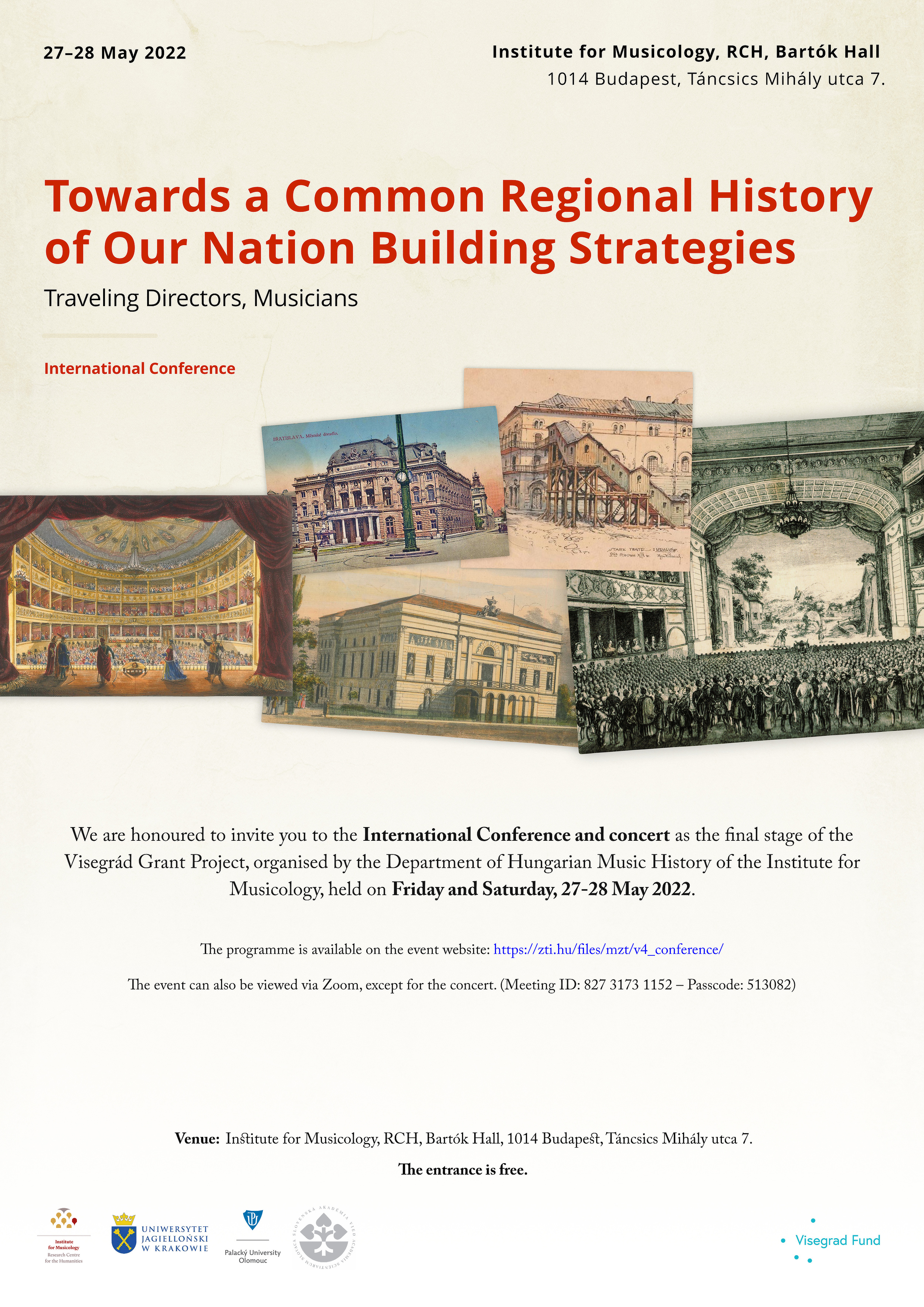International Conference
Towards a Common Regional History of Our Nation Building Strategies. Traveling Directors, Musicians
 International Hybrid Conference
International Hybrid Conference
Institute for Musicology, RCH – Budapest, 26–28 May, 2022
Attempts to emancipate musical historiography of its national boundaries are still at an early stage. During the past decades such attempts in the V4 countries were still restricted by a number of nationally biased historiographies. The resulting national narratives have thus not included regional connections, nor the acknowledgment of the cultural and ethnic diversity of the region as a whole. Our current project, which concluded with this conference, was focused on the migration of musicians and the repertoire of singers and conductors appearing in different parts of the region, with the purpose of revealing the network operating throughout the theatrical practice in the service of nation-building as well as the common features resulting from its regional embeddedness. The exploration of the history of our national theatres gains its true significance by taking into account the regional context, both from a macro- and micro-historical perspective. It is not difficult to recognize the importance of such research projects that go beyond national historiography. Regional co-operation is particularly important on topics such as the 19th-century musical theater in the current Visegrad countries.
This conference was actually planned as a workshop, too. In addition to regular conference presentations, we had also 20 to 25 minutes-long book and project presentations and a moderated discussion about the latest books and projects. We were able to invite a number of prominent speakers at European level to the conference who would not have been able to attend due to lack of time and support. The speakers of the conference (21 speakers in total) represented the highest standards, all of them are leading researchers and teachers from research and higher education institutions in the region. At the same time, the young generation was also present.
You can download the program booklet, the invitation, and the poster here.
As part of our conference, a 4th lecture recital was held, too. The repertoire of the lecture recital was performed by the Liszt Ferenc Prize winner soprano Ingrid Kertesi, and her current student in the Liszt Academy Budapest, the soprano singer Júlia Mária Kovács, with the participation of conductor Gergely Kaposi on the piano. The concert was complemented by short introductory lectures held by experts explaining the selected repertoire illustrating the musical theatrical traditions of each V4 nation. For the lecture recital, the experts (Jana Laslavíková, Tomasz Pudłocki, Kim Katalin, Lenka Křupková and Jiři Kopecký) selected arias that were the most characteristic representatives of the nation-building traditions of each nation under study in some of the countries' musical theaters. Thereby the audience could have an insight into the common strategies of our nation-building strategies in music.
You can download the concert invitation (EN, HU), the poster (EN, HU) and the program (EN, HU) here.
An important goal of our conference was to discuss the form and topic of a possible future joint EU grant application, all speakers at the conference had the possibility to attend a roundtable discussion on the topic, where every participant of our conference took an active part in this common thinking.
Katalin Kim
This conference was organized by the Institute for Musicology in Budapest in connection with the Institute of History of the Slovak Academy of Sciences in Bratislava, the Institute of History of the Jagiellonian University in Krakow, and the Palacký University Olomouc. Conference organiser: Katalin Kim, conference secretary Lili Veronika Békéssy, design of the media materials for the conference (website, poster, invitation, program book) Zsolt Vizinger, technical support Rudolf Gusztin. Sára Aksza Grosz, Beáta Simény, Pál Horváth, István Csaba Németh, Mirjam Winter, Máté Gergely and Szabolcs Illés helped in organization and translation. We are grateful for the help of Erzsébet Bognár Csorbáné and Dr. Gyula Szöllősy.







